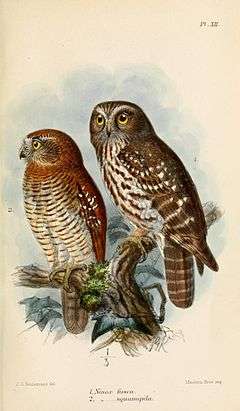Ninox
Ninox is a genus of true owls comprising about 30 species found in Asia and Australasia. Many species are known as hawk-owls or boobooks, but the northern hawk-owl Surnia ulula is not a member of this genus. Molecular analysis indicates the genus is an early offshoot from the ancestors of the rest of the true owls, and are maybe best-classified in a subfamily Ninoxinae with the genera Sceloglaux and Uroglaux.[1] The genus was introduced by the English naturalist Brian Houghton Hodgson in 1837.[2]
| Ninox | |
|---|---|
 | |
| Morepork Ninox (novaeseelandiae) novaeseelandiae | |
| Scientific classification | |
| Kingdom: | Animalia |
| Phylum: | Chordata |
| Class: | Aves |
| Order: | Strigiformes |
| Family: | Strigidae |
| Genus: | Ninox Hodgson, 1837 |
The species of Ninox are:
- Rufous owl, Ninox rufa[3]
- Powerful owl, Ninox strenua[3]
- Barking owl, Ninox connivens[3]
- Sumba boobook, Ninox rudolfi[3]
- Little Sumba hawk-owl, Ninox sumbaensis[3]
- Morepork, Ninox novaeseelandiae[4][3]
- Lord Howe boobook, N. n. albaria - extinct (1950s)
- N. n. leucopsis[4]
- N. n. novaeseelandiae[4]
- Norfolk boobook, N. n. undulata - extinct (1996)
- Australian boobook, Ninox boobook[5][3]
- Timor boobook Ninox fusca
- Alor boobook Ninox plesseni
- Rote boobook Ninox rotiensis
- Andaman hawk-owl, Ninox affinis
- Brown hawk-owl, Ninox scutulata
- Hume's hawk-owl, Ninox obscura
- Northern boobook, Ninox japonica
- Chocolate boobook, Ninox randi
- Philippine hawk-owl group
- Luzon hawk-owl, Ninox philippensis[3]
- Mindoro hawk-owl, Ninox mindorensis[3]
- Sulu hawk-owl, Ninox reyi[3]
- Mindanao hawk-owl, Ninox spilocephala[3]
- Romblon hawk-owl, Ninox spilonotus[3]
- Cebu hawk-owl, Ninox rumseyi[3]
- Camiguin hawk-owl, Ninox leventisi[3]
- Ochre-bellied boobook, Ninox ochracea
- Cinnabar boobook, Ninox ios
- Moluccan boobook group
- Tanimbar boobook, Ninox forbesi
- Halmahera boobook, Ninox hypogramma
- Seram boobook, Ninox squamipila
- Buru boobook, Ninox hantu
- Christmas boobook, Ninox natalis
- Papuan boobook, Ninox theomacha
- Manus boobook, Ninox meeki
- Speckled boobook, Ninox punctulata
- New Ireland boobook, Ninox variegata
- New Britain boobook, Ninox odiosa
- Solomons boobook, Ninox jacquinoti
- Togian boobook, Ninox burhani
Genomic studies of the extinct laughing owl of New Zealand indicate that it may actually belong in Ninox rather than the monotypic genus Sceloglaux.[6] The fossil owls "Otus" wintershofensis and "Strix" brevis, both from the Early or Middle Miocene of Wintershof, Germany, are close to this genus; the latter was sometimes explicitly placed in Ninox (Olson 1985), but is now in Intutula. "Strix" edwardsi from the Late Miocene of La Grive St. Alban, France, might also belong into this group.

In human culture
- "NINOX" is an Australian Army project to develop night-vision goggles; it is named after Ninox strenua.
References
- Wink, Michael; El-Sayed, Abdel-Aziz; Sauer-Gürth, Hedi; Gonzalez, Javier (2009). "Molecular phylogeny of owls (Strigiformes) inferred from DNA sequences of the mitochondrial cytochrome b and the nuclear RAG-1 gene". Ardea. 97 (4): 581–591. doi:10.5253/078.097.0425.
- Hodgson, Brian Houghton (1837). "Indication of a new genus belonging to the Strigine family, with description of the new species and type". Madras Journal of Literature and Science. 5: 23.
- Gill, Frank; Donsker, David, eds. (2014). "Master List: IOC World Bird List – Owls". IOC World Bird List (v 4.1). doi:10.14344/IOC.ML.4.1. Retrieved 2014-04-06.
- "ITIS Standard Report Page: Ninox novaeseelandiae". Integrated Taxonomic Information System. Retrieved 2014-04-06.
- "ITIS Standard Report Page: Ninox boobook". Integrated Taxonomic Information System. Retrieved 2014-04-06.
- Wood, Jamie R.; Mitchell, Kieren J.; Scofield, R. Paul; Pietri, Vanesa L. De; Rawlence, Nicolas J.; Cooper, Alan (2016). "Phylogenetic relationships and terrestrial adaptations of the extinct laughing owl, Sceloglaux albifacies (Aves: Strigidae)". Zoological Journal of the Linnean Society. 0. doi:10.1111/zoj.12483. ISSN 1096-3642.
- Olson, Storrs L. (1985): IX.C. Strigiformes. In: Farner, D.S.; King, J.R. & Parkes, Kenneth C. (eds.): Avian Biology 8: 129–132. Academic Press, New York.
Further reading
- Gwee, CC.Y.; Christidis, L.; Eaton, J.A.; Norman, J.A.; Trainor, C.R.; Verbelen, P.; Rheindt, F.E. (2017). "Bioacoustic and multi-locus DNA data of Ninox owls support high incidence of extinction and recolonisation on small, low-lying islands across Wallacea". Molecular Phylogenetics and Evolution. 109: 246–58. doi:10.1016/j.ympev.2016.12.024. PMID 28017857.